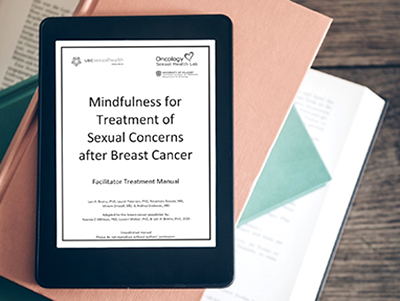
Researchers are examining the effectiveness of a new mindfulness-based program to help improve the sexual health of women affected by breast cancer.
Sexual pain associated with breast cancer can prolong a woman’s recovery and negatively impact her sex life. Whether this patient group experiences greater sexual satisfaction and quality of life following a mindfulness-based program versus a sex education-based program is the focus of new research led by Vancouver Coastal Health Research Institute researcher, Dr. Lori Brotto.
“Mindfulness training has been shown to quiet negative emotional responses,” says Brotto. “This can circumvent pain catastrophizing and hypervigilance, and research has found that it can reduce pain intensity, which we believe may help women manage the emotional effects that can lead to a reduction in sexual health and arousal.”

Brotto’s ongoing “BREAST study: breast cancer and sexuality treatment” is recruiting up to 100 women ages 19 and older to participate in two the streams of recovery following treatment for breast cancer: 1) sex education and 2) a mindfulness-based treatment approach. Both are designed to help improve women’s sex lives.
Breast cancer treatment often involves taking hormonal therapies over the long-term to reduce the risk of cancer recurrence, the effect of which eliminates or greatly reduces women’s estrogen levels, explains Brotto. For women of childbearing age, this induces menopause and its related symptoms, such as night sweats, along with increased vaginal dryness, thinning and inelasticity.
“This can make sexual activity, specifically vaginally penetration, very difficult if not impossible for some women, and can significantly drop their sexual motivation, desire and arousal.”
Women who have had part or all of their breast removed may also have lost one of their main or key centres of arousal.
Reduced sexual health can take a significant toll on a woman’s mental health and vice versa, making women recovering from breast cancer twice as likely to develop mood disorders such as anxiety or depression, according to some studies1.
For example, a 35-year-old woman who is not mentally prepared for menopause can experience negative impacts on her sense of self, body image and well-being, imparts Brotto.
“The data show us that the majority of breast cancer survivors experience concerns around their sexuality and sexual satisfaction.”
Research indicates that practicing mindfulness can lead to positive structural and functional changes in the brain, says Brotto. “Structurally, it can promote neuronal growth in areas of the brain that correspond with deep awareness. Functionally, it can help decouple feelings of pain from the emotional response associated with that pain, such as feelings of sadness and fear, as well as a loss of motivation.”
Finding the best approach to ease sexual distress among breast cancer survivors
Originally designed as an in-person program, COVID-19-related restrictions on group gatherings necessitated that Brotto’s study transition to an online platform, which had the added advantage of making it available to women throughout British Columbia.
The eight, two-hour online sessions are facilitated by graduate-level PhD students or clinical psychologists who have experience with cancer survivorship and sexual health. Facilitators leading the mindfulness stream have additional training in delivering mindfulness-based interventions, and the prerequisite of having a personal mindfulness practice.
Participants receive handouts with exercises they are requested to complete for the week, and those in the mindfulness-based group also receive recordings of the mindfulness exercises.

Participants are given surveys before, during and after participating in the study to provide baseline data and progress reports on their levels of distress, pain and sexual function.
Study results will determine whether participants in the mindfulness-based group experienced additional improvements in their sexual function, including increased sexual desire and reduced distress and/or pain, compared with the sex education-based group.
Brotto and investigators are also noting any related characteristics among women who benefited more from the mindfulness-based approach to inform recommendations on how to structure similar support programs in the future.
“While we predict that both groups will show significant improvements on all of our measures of sexual function, pain and distress, we anticipate that the mindfulness group will benefit even more in the area of a reduction in feelings of sexual distress,” says Brotto.
Learn more about the BREAST study: breast cancer and sexuality treatment.
1 Reuters Health - Breast cancer survivors may have lingering mental health effects


